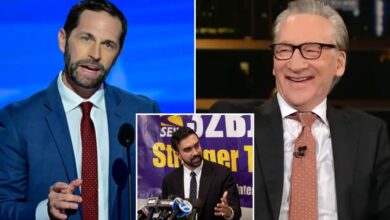Marc Maron On Not Getting ‘Panicked’ While Speaking Truth To Power (As Well AsHis Fellow Comedians And Podcasters)
Marc Maron is enjoying a hot summer, literally and professionally.
The comedian and actor is the focus of a documentary, Are We Good?, that just got picked up for theatrical distribution this fall after making the festival circuit this year at both SXSW and Tribeca.
He also co-stars alongside Owen Wilson in Apple TV+’s golf comedy, Stick, which just got renewed for a second season around the links. He’s also making the rounds as part of the animated big-screen sequel, The Bad Guys 2, and taking a well-deserved curtain call of sorts on the podcast that helped him breakthrough in a big way 16 years ago, WTF with Marc Maron.
And for comedy fans, he’s set to release his sixth stand-up special, and second for HBO, Marc Maron: Panicked, on Friday. I sat down with him over Zoom recently to talk about the special, about playing the late radio talk-show host Alan Berg in The Order, and the importance of speaking truth to power right now.

DECIDER: The special is great. Congrats.
MARON: Oh, good. That sounded earnest and without hesitation. Thank you, buddy.
I am sincere now!
I know. It’s a new Sean.
Progress, not perfection. Speaking of which, how do you feel you’re doing personally when it comes to entertaining? I know you talked a little bit about it in the hour, and you seemed as though you felt your most entertaining when you were pretending to be a different comedian.
Oh, really? The “anti-woke” guy?
Whether it was Theo Von or the Alaskan babysitter, in both cases you were so much more animated.
Yeah, it’s interesting. Because I’ve become highly aware of structure with these things and there’s so much stuff in that special, dude. When I think about it, cuz I’m talking to people about it and I’m seeing what bits they land on. And then I realized like, Oh my God, there’s so much in there. I mean, I loaded that thing up. That could have been two specials. But I think you’re right. But I do think the pace, the shift in pace, there. I think I exist in a lot of different forms. Like in the opening bit. I see it more in acts now, some of these specials, like I shifted my tone for the political stuff. So it was a little more conversational as opposed to strident. And then sort of, finding the wiggle room to kind of make fun of the left and also make my points. It was kind of challenging because it’s easy when you’re talking like that, and if you’re fueled by anger to make it kind of unappealing. But I was very careful to kind of ease into that stuff because I wanted it to be for everybody. So I was aware of that.
And then when I did the entertaining stories, I amped it up. Like I was all-in and sort of that old pace that I used to have all the time, which was slightly manic, because I thought the story required that. And then when that lands. And then I pulled back. And I think the reason why those two things you’re talking about, whether it’s Theo, who I think I’m doing better now (as an onstage impersonation), but too late. And the anti-woke sex abuser babysitter guy, is that there’s space for it. Like when I lock into those, the space around the Hitler bit is very deliberate. So they stand out a lot, you know, but yeah, it’s fun.
DECIDER: You mentioned being less strident. So I’m curious to know. I’m asking this not to break any sort of traditions, but just to use common languages that we have and translate it to real life: Do you feel like you’re also, at age 61, making a transition from bleeding deacon to elder statesman, in terms of comedy?
I think comedically I’m feeling a little more or as comfortable as I’ve ever felt. I think I was really more locked in with this special than any of them, which is growth, which is good. Like I really wasn’t even doing the things I do to make myself crazy beforehand unconsciously with anxiety or whatever.
I felt that the production design was was beautiful and very intentional. The theater was very intentional. I had a relationship with all this stuff. My clothes were very intentional. There was nothing that wasn’t part of what I was trying to do. In terms of bleeding deacon, well, I think I have gotten less angry in terms of where that comes from. I think there was part of me that was, I wouldn’t say posturing, but was, you know, out of insecurity or a certain amount of fear, or just anger. I didn’t have any much control over it in the way of I thought that was the way it had to be. As the years go by and after the last special, From Bleak to Dark, the kind of area of creativity that opened for me, which was a profoundly dark but deep vulnerability, it gave me a different place to work from. So I think that elder statesman, I think I’m just more comfortable in my point of view. And I realized, and it was really a conscious realization about a week before I taped, that if I come out of the gate intense and like forcibly, trying to have this angry point, you know, that’s alienating. You know, it’s alienating in general. And I’ve been that guy in general, too, in life. So it was really just a slight tweak to just make it conversational because we are living, all of us, no matter who you are politically, in the same reality. And it is very hard not to have some sort of like overwhelmed, either frightened or, if you’re on the other side of it, exciting opinion of it, but it is crazy. So once I really locked into the fact like this is all crazy. Let’s just, right? As opposed to like, this is fucking crazy, you know, like so, but it was conscious. So I mean, I guess I’ll take elder statesman, though I do get a little bleeding deacon-y a bit lately about the state of comedy if I’m left to talk too long.
But as I and other people have noted, it’s so great that someone of your stature is willing to do that because so many people aren’t.
Yeah. I mean, I do it in ways that are not, somehow or another between me and Brendan (McDonald, his podcast producer) and myself, without Brendan, to be dragged into the broader cultural dialogue of divisiveness is a dead end. And it just becomes, you know, some sort of wrestling match.
So the way I do it on my own terms, whether I write about it or I talk about it without mentioning names and stuff may annoy people that have a clickbait brain or a troll aspect. But yeah, I have been pretty outspoken and ahead of the curve on that, too, since a lot of them are starting to buckle a little bit.
Right. It sounds like you also were taking your own advice that you were giving in the special to progressives in terms of you yourself not being a buzzkill.
Well, yeah, I think it’s tricky because it becomes clear, as I said in the special, that there is no unifying ideological and policy-driven Left. So the fact that they call everyone left liberals or whatever, I mean, it’s fine as name calling, but most people are on their own. They have very specific things that they’re passionate about. Whether it will ultimately make a difference, just untethered from real political action, I don’t know. But it is what they’ve chosen is that defines their personality in terms of their fight. And I think that there is a way to talk about that in a broader way that isn’t buzz-killy.
And also I’d be remiss if I didn’t mention your featured role in the movie The Order, which is great. What did you take from that experience of filming in terms of, you’re playing a real-life guy who was very outspoken about the danger that was out there.
The danger that eventually took his life was not even on his radar. But he was a guy who believed in democracy, and a guy who believed in a sort of social tolerance, and justice. But he was an interesting guy. And I knew about him before I was offered that role. They offered me the role and they said, would you want to play Alan Berg? And I said, who else is going to play him?
He’s in your wheelhouse.
Yeah, he is my wheelhouse. And it was interesting because I was able to kind of manufacture the look because I had a beard and we were able to work my hair. There’s not a lot of him available to listen to. But I got a sense of him. And I think that it was important for me to be part of that film in, in that role, just illustrating the dangers there, because now there’s a hundred Orders or 500 Orders and it’s almost overwhelming to take in. And I also thought maybe if I did it in the movie, it wouldn’t happen in real life, you know.
Do you feel any better about it now?
About what?
About real life?
No! I mean, every day is overwhelming. And that’s part of the plan of flooding the zone. And it becomes very hard to compartmentalize, in a general way. so you can live a life without anxiety if you have a certain, you know, psychological inclination towards, you know, panic or anxiety or, or just rational thought.
So it’s obsessional anxiety, as you say.
Yes, that’s what I have obsessional anxiety, but I feel OK today. I didn’t sleep well, so I’m a little tired, which helps sometimes.
Especially coming into a full day of press. Yeah, I appreciate your time. Did how you reacted or overreacted during the fires in Los Angeles this January teach you anything about how to deal with the broader context of panic?
Well, I guess. I mean, I find that, when I’m up against the wall, I can usually lock in and do what needs to be done. But also, I don’t know how you deal with it because, it’s just like, the authoritarianism problem is different than the climate problem. I mean, the one thing you realize when those things happen, but eventually you go into a certain adaptive denial is that this isn’t going to stop happening, especially with climate. So yeah, this is the new reality. And you have to make life choices around, I was like, I got to get out of here. But then, you know, half a year goes by, year goes by. You’re like, all right, well, maybe it won’t be that bad this year. You know, you do what you’ve got to do to, to sort of adapt and survive. With authoritarianism. I don’t know. I guess we’ll see how far it goes, but it’s all in place to go as far as it wants to. I don’t really know how to deal with that other than to go day-by-day and, you know, and hope that they don’t come for me.
Marc Maron: Panicked premieres Friday, August 1 on HBO and HBO Max.
Credit to Nypost AND Peoples




